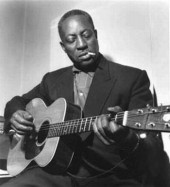William Lee Conley Broonzy was born in Scott County, Mississippi ,on June 26, 1883. In addition, another source says Broonzy had a twin sister name Lannie Broonzy who says she has proof that she was born in 1898, on June 26. This would have proved that Broonzy was five years younger than he pretended. Big Bill was the son of Frank Broonzy and Mittie Belcher, who also had seventeen other children (Bruynoghe 9). During this time period, many black men added years to their age either to get a job or join the military, so o the exact date of Broonzy's birth is not clear
Broonzy's life as a child was hard because he received only minimal schooling. He had to quite school to help his sharecropping family around the house. Before he moved to Arkansas, Broonzy had learned how to play the fiddle from his uncle Jerry Belcher. At the age of fourteen, he start working for tips at country dances, picnics, and played for the church (Broonzy). During the years 1912-1917, he worked part time as a preacher and violinist. Also, Broonzy served in the US Army during World War I. After his discharge, he returned back to Arkansas. This is when he decided that farming was not what he wanted to do for the rest of his life. He wanted to make his living as a guitar player and singer. In 1924, Broonzy moved to Chicago to start his music career partly because of all the racism that was happening in the South. Under the guidance of Papa Charlie Jackson, Broonzy learned how to play the guitar. In the 1930s Broonzy became known as one of the major artist on the Chicago Blues scene. During this time he performed with other top blues artist in Chicago-- like Memphis Minnie, Tampa Red, Jazz Gillum, Lonnie Johnson, and John Lee Sonny Boy Williamson. Also, while trying to make it in the music business, he worked as a janitor and maintenance man (Big Bill Broonzy).
In 1938, Broonzy per formed at John Hammonds famous Spiritual and Swing concert at Carnegie Hall in New York City. This was the first time that he had ever performed in front of a white audience. After the concert, people start calling him Big Bill Broonzy. At this time Broonzy received newfound fame as the father of Chicago blues until World War II (Broonzy). He was one of the best known blues players and recorded over 260 blues songs, including Feelin Low Down, Remember Big Bill, Make Me Getaway, and Big Bill Broonzy Sings Country Blues (Brewer 15). His recording career spanned five long decades, as he traveled from Mississippi to Chicago and even to Europe, where he became well-known. There are forty-two of his
After the arrival of artists like Muddy Waters and the playing of the electric guitar, Broonzy's brand of blues was pushed aside. Rather than retire, he changed his style of music to folk blues. In 1951, Broonzy toured Europe where he performed standard blues, traditional folk tunes, and spirituals to appreciative audiences. The following year Broonzy returned to Europe with pianist Blind John Davis. He opened the doors for other American blues artists to tour there as well. In 1955, with the help of writer Yannick Bruynoghe, he told the story of his life in the book Big Bill Broonzy. This book was originally published in London. Big Bill Broonzy's book was one of the first autobiographies by a blues man (Big Bill Broonzy). In 1957, William Lee Conley Broonzy was diagnosed with throat cancer. He continued to perform, although he had with great pain, until he died of throat cancer on August 15, 1958. In 1980, he was inducted into the Blues Foundation's Hall of Fame.
I created my own profile using nUCLEArcENTURy.COM and you should too!
